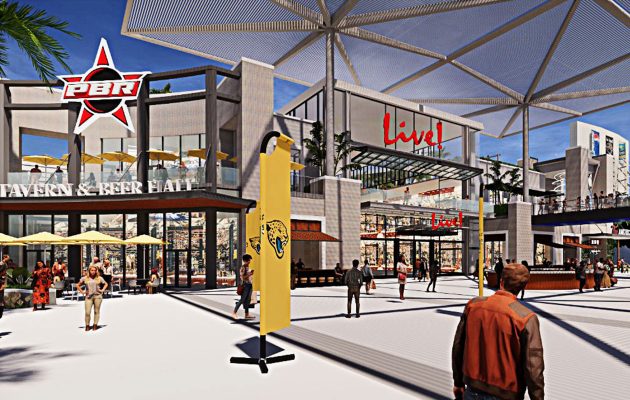Questions arise on sustainability, financial feasibility of Lot J project
Posted on December 1, 2020 By Editor Brooklyn, Downtown, Springfield, Neighborhood News, Top Stories

Mayor Lenny Curry’s generous incentives for Shad Khan’s $450 million multi-use development of Lot J has stirred up city residents like nothing else since the controversy over the sale of JEA.
The legislation has had a bumpy ride in the City Council, where it is being challenged and at least two amendments are in the offing. But even as the bill is being revised, a decision of whether to give the project the go-ahead could be decided as early as Dec. 8.
Curry is proposing to give Khan’s Gecko Investments and the Cordish Companies of Baltimore $233 million in tax dollars for the development that would be one of the largest in the city’s history. Among the details:
- Live! District would have 75,000 square feet of restaurant and retail space, 40,000 square feet of Class A office space, a 150- to 250-room hotel and two mid-rise apartments buildings with 400 units. The city would own Live! District and lease it to the Jaguars for 35 years with four 10-year extensions, and therefore, the property would not generate tax revenue.
- The city would build parking garages with 700 spaces and pay for infrastructure improvements that would include a 700-space surface parking lot built over an existing stormwater retention pond to the west of Lot J. The infrastructure improvements are estimated at $77.4 million.
- The city would be responsible for up to $15.1 million in cost overruns for the publicly owned portions of the Lot J project and the developer would cover other project cost overruns.
In addition, the developer would receive incentives: a 75% Recapture Enhanced Value Grant for 20 years capped at $12.5 million for the apartments, which has already been approved by DIA and a $12.5 million grant upon completion of the hotel.
A financial analysis done for the Jaguars by Chicago-based C.H. Johnson Consulting Inc., estimates the Live! District would create 1,070 full-time equivalent jobs and create a $456.6 million economic impact over 30 years beginning in 2022.
City Council Auditor Kim Taylor said the deal would only generate 44 cents in revenue for each $1 spent by the city, although the City’s Office of Economic Development put the figure at $1.69.
No independent market analysis of the development has been done to determine if it is economically viable and sustainable.
Lamping has said if the City Council approves the legislation, construction could begin in the first half of 2021 and take three years to complete.
But Lot J, a former industrial site, is environmentally contaminated that would have to be cleaned up in accordance with federal environmental regulations before any construction could begin. The city, which would pay for the cleanup, estimates it would cost $77 million.
Correspondence between the Mayor’s Office and the City Auditor’s Office indicates the cleanup could take three years. And the auditor notes that the deal would give the developer seven years to get Live! District completed and up to 12 years to finish the hotel.
Khan, who donated $150,000 to the mayor’s re-election campaign, and Cordish have been negotiating the Lot J deal with Chief Administrative Office Brian Hughes in the Mayor’s Office for more than two years, said Jaguars President Mark Lamping.
The deal, however, only became public Oct. 5 at a news conference held by Curry and Khan. Curry said he was sending the legislation to the City Council. It was the expectation that it would be approved before the end of the year. Meanwhile, six weeks later, Lamping unveiled yet another Khan development for Metropolitan Park and the Shipyards that would include a Four Seasons Hotel, a medical complex and residential.
The push back on Lot J was immediate. Why was the city giving so many incentives to a billionaire, while the city was covering half the cost of the project without getting incentives from Khan?
In particular, residents want some assurance that the team will stay in Jacksonville after its lease with the city expires in 10 years. Speculation is rampant that Khan could move the team to London, where he has already moved two home games.
District 14 City Council member Randy DeFoor, who represents Riverside, called it “a fat deal.”
“Sweetheart deals are great, but we want a married deal, and the only way this project makes any sense at all is if the Jaguars stadium lease is extended for at least 25 years and they commit to a certain number of home games,” DeFoor said.
At-large City Council member Matt Carlucci, a San Marco resident, said Khan was getting special treatment. He questioned why the deal was negotiated by the Mayor’s Office and not the Downtown Design Review Board and the Downtown Investment Authority, as required by city code.
Three civic groups also weighed in:
- The Urban Land Institute North Florida offered its expertise to analyze the deal, saying “any project of such magnitude – financially, catalytically, and optically – deserves sufficient time and transparency.”
- OurJax, a citizens watchdog formed after the JEA scandal, asked the City Council “to slow down the unnecessarily rushed and non-transparent process. … It is not good enough for the mayor and the City Council to say, ‘trust us.’”
- The Jacksonville Civic Council, in a letter co-signed by former Mayor John Delaney, also called for transparency, urging the release of all documents and calculations related to the project.
According to a survey by Barcelo & Company, 70% of the residents polled oppose the proposed deal, with 25% strongly opposing it. Only 17% favored the deal and only 6% strongly favor it.
Carlucci introduced a bill to hire a firm to take an independent look at the deal and another bill that would send the deal to DIA to be negotiated.
District 5 City Council member LeAnna Cumber, who represents San Marco, introduced a bill that would send the existing deal to DIA to be reviewed.
Carlucci and Cumber each convened Town Halls for the public to weigh in.
City Council President Tommy Hazouri took the unusual step of suspending the legislation’s usual review by council committees and instead convened a Committee of the Whole, so the entire council could review the legislation.
The second meeting of the Committee of the Whole on Nov. 19 revealed the true extent of the tensions generated by the Lot J deal, with sharp words exchanged among the City Council members, as well as between Hazouri, Lamping and Hughes.
Asked why the deal has numerous waivers that excluded DIA, Hughes said the city owns Lot J and already has a lease with the Jaguars and didn’t think it was necessary to go through the DIA.
But Hazouri said the Mayor’s Office “violated the spirit of what the DIA is supposed to be doing.”
Attorney Paul Harden, who is working on the Lot J deal, said they are making concessions to the city that will be reflected in the revised bill. These include giving the city 50% of the net revenue from the Live! District during the Florida/Georgia game. They also pledge not to sell Live! District until five years after its completion.
But the consensus of the City Council members was that there were too many questions yet and they need to see a final bill.
Hazouri has scheduled another meeting of the Committee of the Whole at 10 a.m. Thursday, Dec. 3. If the committee is satisfied, it could vote and send its recommendations to the City Council, which could vote on the project as early as Tuesday, Dec. 8.

Carlucci pushes to put Lot J negotiations in hands of DIA
At-Large City Council member Matt Carlucci thinks the Lot J deal has been negotiated backwards, and he’s hoping to get it turned around.
“The mayor negotiated this deal with the Jaguars and Cordish. It’s very lopsided. They’ve thrown it over to the City Council for us to review and pass,” Carlucci said. “That’s not how it works. “The Downtown Investment Authority negotiates these contracts. They review the viability and sustainability and put together how project should be designed and what will work. They negotiate a lot of the incentives.”
City Administrative Officer Brian Hughes said the city negotiated with Jaguars owner Shad Khan, his company Gecko Investments, and the Cordish Companies of Baltimore because the city has a long-term contract with Khan and owns the property.
But Carlucci said the DIA negotiated the development agreement for the District on the Southbank, which is to be built on land formerly owned by JEA, and it is currently negotiating a development agreement for the River City Brewing Company, which also is leased by the restaurant from the city.
Carlucci said the last time the city handled the negotiations was for Daily’s Place, an amphitheater built by Khan.
“DIA wasn’t involved. They had beautiful renderings of the building but when it was built, it was nothing like the renderings,” Carlucci said. “DIA would have made sure about the architecture.”
Carlucci said the mayor has put the City Council in the position of doing the work of the DIA.
“The mayor’s bill is full of waivers keeping DIA out of the project,” Carlucci said. “We find ourselves as a council doing the work of DIA. That’s why it’s not working well. We’re not subject-matter experts.”
Carlucci has a substitute bill that would amend the Lot J legislation to remove the waivers that bypass DIA and require that the deal be negotiated by DIA.
District 5 City Councilwoman LeAnna Cumber, who is the council’s DIA liaison, has a similar amendment that would send the legislation as it exists to DIA for review.
Cumber introduced her bill at the Nov. 19 Committee of the Whole meeting but it was deferred because there wasn’t a quorum. Cumber didn’t respond to a request for comment.
Carlucci said he has reached out to Cumber and hopes they can come up with a consensus bill after the Thanksgiving holidays.
“I haven’t read her bill, and she hasn’t read mine, but I think we’re headed in the same direction. At the end of the day, DIA by code is to manage and have oversight of any of the contracts associated with Downtown development projects. The mayor wants the oversight. That’s outside the purview of the city code.
“It’s not a slight to the mayor. It doesn’t mean we’re against Lot J. I’ve voted for every Jaguars’ bill going back to the beginning,” Carlucci said. “Call me crazy. I’m just trying to follow the law.”
By Lilla Ross
Resident community News




 (No Ratings Yet)
(No Ratings Yet)




